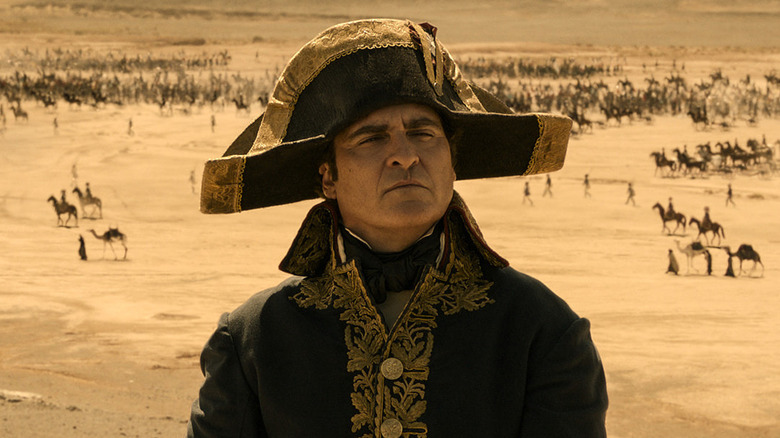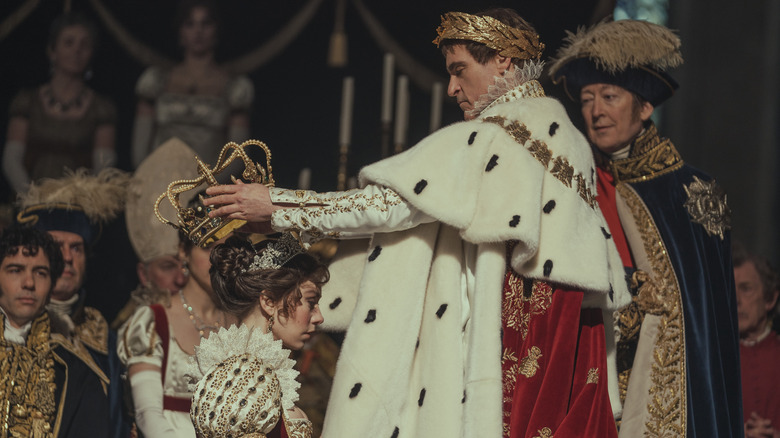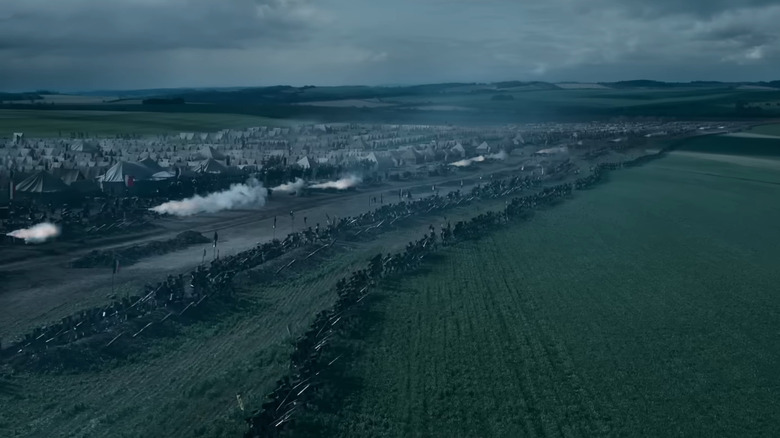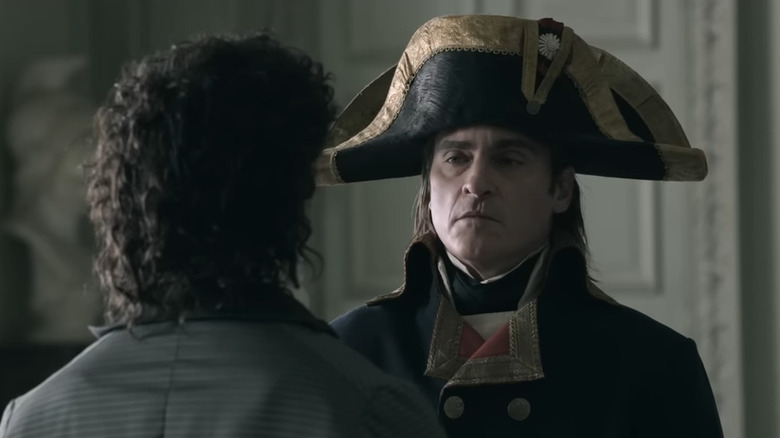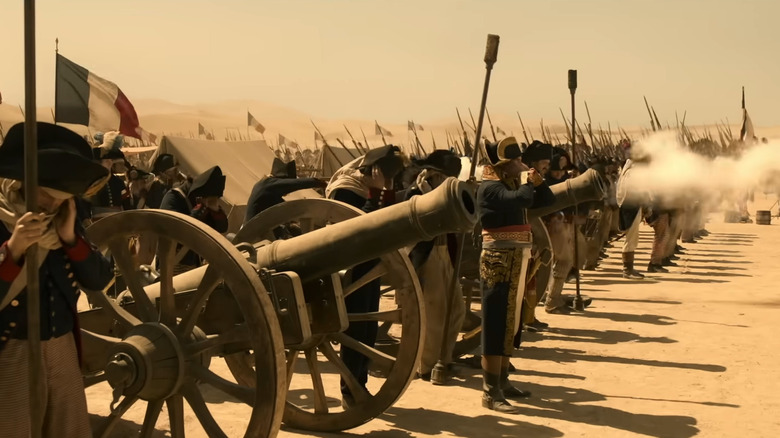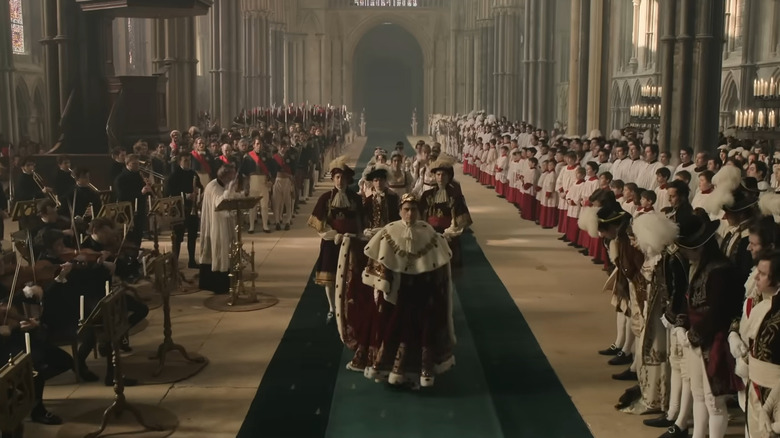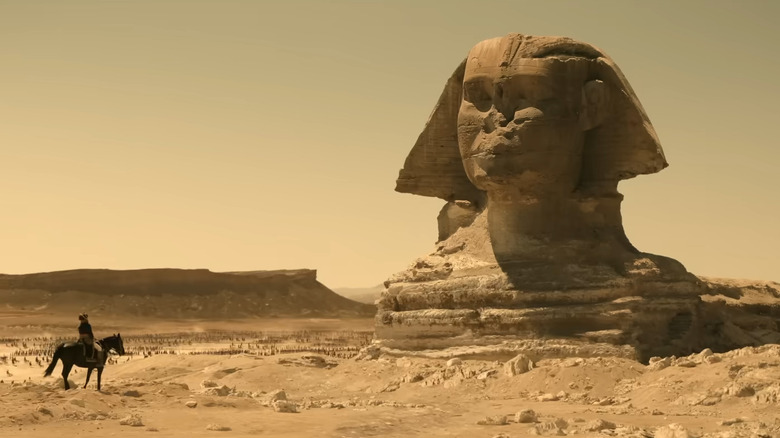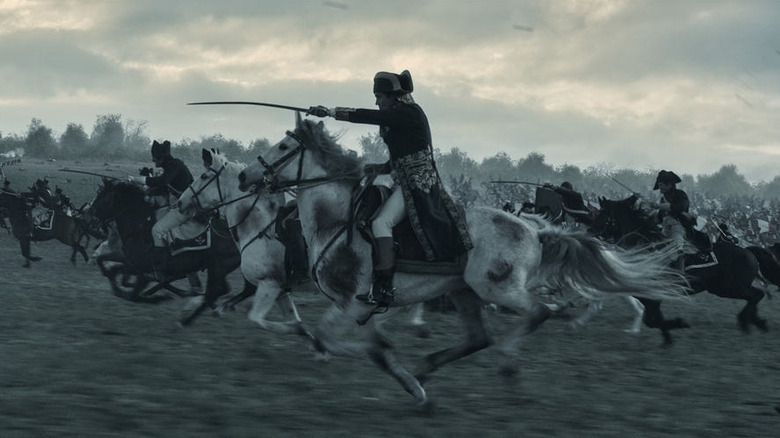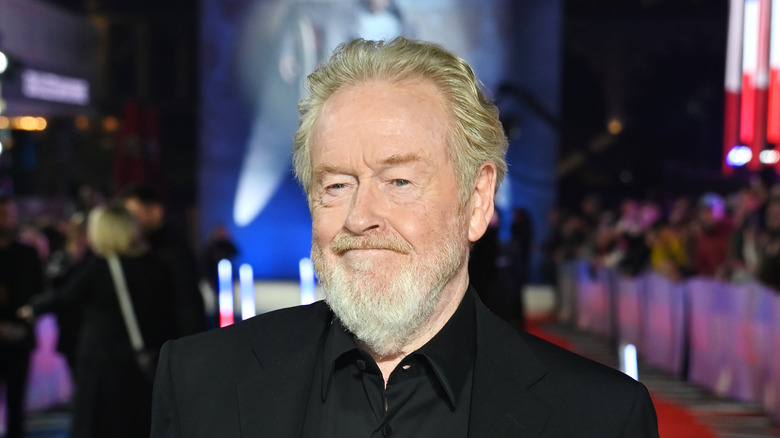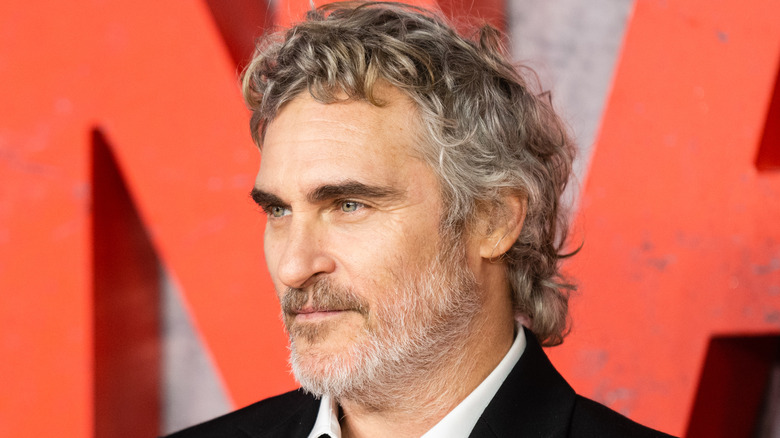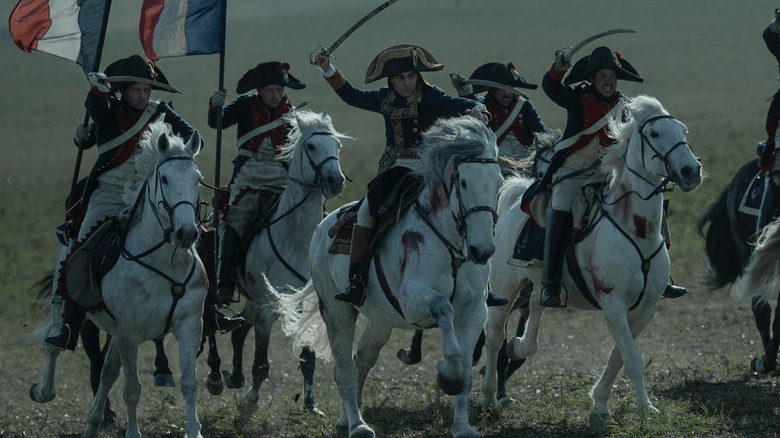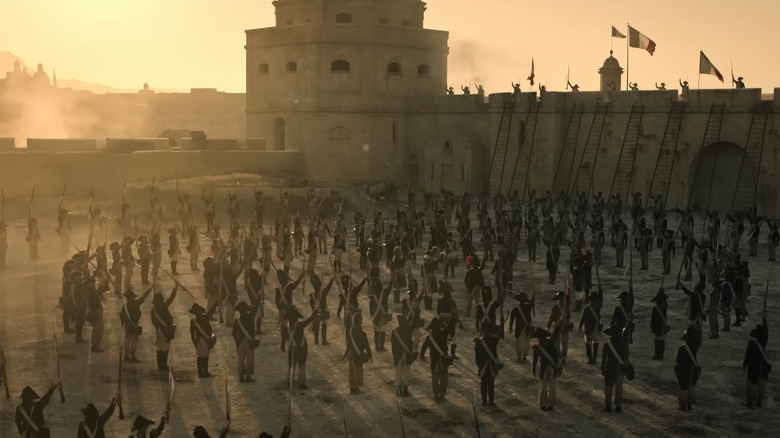The Ending Of Napoleon Explained
No one makes historical epic films quite like Ridley Scott, and he's delivered a new one unto Hollywood in 2023 with "Napoleon." He's had highs in the genre, like "Gladiator" and "Kingdom of Heaven," and he's had some duds, like "Exodus: Gods and Kings" and "Robin Hood." "Napoleon" falls somewhere in the middle of that pack — too stunning in its visual grandeur to be seen as a disappointment, but too tonally and narratively disjointed to feel complete.
Joaquin Phoenix is great as Emperor Napoleon Bonaparte, but he doesn't get as much room to stretch as fans of the actor may have hoped for. Vanessa Kirby arguably steals the show right out from under him as the other protagonist, Napoleon's first wife and lifetime love, Joséphine. As you'd expect from an epic of this scale, the rest of the cast is massive and littered with talented actors, from the always-excellent Ben Miles to Édouard Philipponnat's subtle performance as Russia's Tsar Alexander I.
"Napoleon" is a gargantuan film with a somehow-even-longer director's cut on the way. And since the end of the eponymous conqueror's career is the part he's most infamous for, the movie also delivers a lengthy final act. Here's everything you need to understand about the ending of "Napoleon," what it means, and how it compares to the true story.
What you need to remember about the plot of Napoleon
"Napoleon" begins at the height of the French Revolution, showing the brutal decapitation of Marie Antoinette (Catherine Walker) by guillotine. In snatches and fragments, we see Napoleon's complete rise and fall, starting with his triumphant victory as a captain at Toulon. He's promoted to brigadier general, begins courting the freed aristocrat Joséphine, and takes a bloody stand against the encroaching Royalist insurrection in 1795.
We then leap straight over Napoleon's conquest of Italy to his time in Egypt. Though his campaign is going well, he returns home to France abruptly after hearing that his wife is having an affair with another man. The depths of Napoleon and Joséphine's twisted, messy romance are revealed, while Napoleon organizes a coup with his brother. As First Consul of France, he attempts to assert himself over England, but the rival nation refuses to recognize him. So Napoleon essentially crowns himself Emperor of France instead.
More montages follow. Napoleon wins an icy battle at Austerlitz, and Joséphine proves unable to bear him an heir. He divorces her, remarries, and quickly sires a son with the Austrian archduchess Marie Louise. His hubris gets the better of him in another Russian campaign, which ends in bitter cold and defeat. Napoleon is ousted and exiled to the island of Elba. But ever the egotist, he returns home with his loyalists in a bid to reclaim the throne — just in time to learn that his beloved Joséphine has died.
What happens at the end of Napoleon?
After commandeering a ship and sailing back to France, Napoleon is confronted by soldiers he once led into battle. Clearly, they remember their time under him fondly, as he quickly gathers a sizable army. With that — and the combined forces of England, Prussia, the Netherlands, and Germany united against him — the stage is set for the Battle of Waterloo.
In the film, the battle plays out in almost excruciating slowness, but that's by design. It's obvious from the start that the French army is in a difficult spot: downhill from a fortified English position, with muddy ground between the two armies, and the Prussians much closer than Napoleon had expected. When the French infantry begin to march their way across the battlefield, the distance seems nearly insurmountable.
The film also does an interesting job of juxtaposing Napoleon with his English foil, General Arthur Wellesley, Duke of Wellington (Rupert Everett). Throughout the film, Napoleon is shown in no uncertain terms as a battlefield commander. At Toulon, he's visibly anxious before the fighting starts, but he shows no such doubts in Egypt or at Austerlitz. At Waterloo, however, his body language tells us everything. The upright poise and certainty that define him in the earlier battles belong entirely to Wellington. Though he makes a valiant charge himself, Napoleon knows that the battle is lost.
Defeat at Waterloo leads to shame and exile
In the aftermath of Waterloo, Napoleon is exiled once again. Only this time, there's no hope for a triumphant return. On a ship in port at Plymouth, Napoleon tries to avail himself of English hospitality, speaking warmly about the good food and the loveliness of the country. His compliments fall on deaf ears, though. Rather than being allowed to retire in England, or even in France, Napoleon faces his second island exile — this time to the South Atlantic island of Saint Helena.
Though peaceful and cushy, this new home is shown to be a far cry from what Napoleon is used to. Cacti are the dominant plant life, and the wine the former emperor adores so much is ruined by flies dropping into the glasses. In reality, Napoleon's living conditions on Saint Helena were rife with health concerns, including pervasive dampness at his Longwood House estate and copper arsenite in the wallpaper.
The final scene of "Napoleon" shows him sitting outside, watching as two young girls stage a pretend swordfight with sticks. He tries to explain to them how important he once was, but time has already moved beyond him, and they catch the lies in his stories. As the scene fades, Napoleon slowly keels over — a simple, visual marker of the still-debated illness that ended his life. The words of Joséphine that he's been hearing deliriously finally call him home to her — or so he hopes.
What the ending of Napoleon means
"Napoleon" spends precious little time on its subject's exile on Saint Helena, reducing over five years down to just a pair of brief scenes. By this point in the film, though, that kind of condensation is familiar. There's no explanation of the cause of Napoleon's death. The movie seems entirely uninterested in those details. The point Ridley Scott seems to want to make is that Napoleon dies in a wholly uninteresting way, passing away like any unspectacular man, far away from any semblance of the legend he hoped to leave on the world.
Of course, Napoleon did become a legend. His name is known across the world, even today. But his legacy is that of a failed conqueror — the last breath of a certain subspecies of man confined to the annals of history. The two girls who mimic a great duel before him on Saint Helena could be meant to mirror the deposed emperor himself, who was only ever playing at being a true warrior. But that interpretation seems at odds with the film's battle scenes — the only moments when Napoleon appears truly as impressive as he sees himself.
Another reading is that the children merely represent the passage of time beyond him. His death is not the end of tyrants or pointless wars, after all. What the film does state quite clearly is the bloody price of Napoleon's personal crusades. When your "greatness" comes at the cost of at least three million lives, how great can you possibly be?
Destiny, providence, and ego
A recurring idea throughout "Napoleon" — mostly coming from the man himself — is that his rise to power is fated. "My destiny is more powerful than my will," he tells Joséphine during their divorce, citing his need for an heir. He also repeatedly states that "providence" delivered him onto the throne of France. Napoleon seems to truly believe these things. He asserts his fate as the man who will unite Europe in a "glorious peace."
Yet in the end, it's not destiny or providence, but all ego — the justifications of a sad, insecure man who stumbled into being decent at making war. He's incapable of generating self-approval, so he looks to the world beyond. If he can conquer enough land, the evidence of his importance will be unquestionable. In other words, Napoleon is obsessed with creating a reality in which his ascent would seem destined. But in his heart, he knows he's still, as his wife makes him say early on, just a brute.
In his final scenes on Saint Helena, Napoleon hears Joséphine at every turn — dreams or figments of an overactive imagination. They call him to her on the other side of life, but they also suggest a deep sense of regret within the failed tyrant. "Let's try this again," Joséphine's voice echoes. "This time, I'll be the emperor, and you'll do as I say." The words suggest that Napoleon might have finally given up on the lie he constructed.
The myth of great men
Napoleon's obsession with greatness isn't born in a vacuum. He's constantly comparing himself to legendary figures like Julius Caesar and Alexander the Great. Like them, he believes himself destined to conquer the world, but he struggles to accept the changing times he exists in. The very revolution that first brings Napoleon to power is a response to the untenable excess of the aristocratic elite — a class that by its nature gives life to the myth of great men.
For all of Napoleon's talk of grand conquests and legacies, he only ever looks backward when envisioning what greatness looks like. And though he dominates most of Europe for a short span of years, the new Roman Empire he dreams of never comes about.
This whole conundrum is perfectly visualized in one of Napoleon's scenes in Egypt, where he has men open an ancient sarcophagus to see the mummy inside. He goes up on his toes and eventually brings over a box to stand on, all to meet the eyes of the old pharaoh or royal entombed within. He even puts his beloved hat atop the sarcophagus, as if he is imagining himself becoming a pharaoh of the new age. But then the mummy slips, jostling dust and falling against the side of the box. It is, after all, just a dead thing. Napoleon will soon be the same, and in the moment, he is merely a defiler.
Famous last words
Right before the credits roll, Ridley Scott leaves us with Napoleon's last words: "France ... Army ... Joséphine ..." These aren't exactly right, but they're close enough. According to the historical record, Napoleon's final words were, "La France, l'armée, tête d'armée, Joséphine," directly translating to "France, the army, head of the army, Joséphine."
It is an absurdly literary way to go out, quoting the handful of things by which you defined your life. Reading into the delirious utterings of a dying man isn't necessarily productive, but these last few thoughts do reflect the way Napoleon surely saw himself: He was a Frenchman — the greatest, perhaps, in his estimation — a soldier and general, and a lover to one particular woman.
This unwavering (or at least unvanishing) image is reflected in Napoleon's dress throughout the film. When they first meet, Joséphine calls it a costume. He objects, stating that it is his uniform. As the movie reaches its end, it becomes more obvious how correct Joséphine was in her assessment. Even in defeat and exile, Napoleon keeps the hat on. He keeps the coat and the buttons. He keeps the stance. In both words and presentation, he continues to project the idea of what he once was and might have been. That doesn't save his legacy, though.
What has Ridley Scott said about the ending of Napoleon?
In a recent profile for The New Yorker leading up to the release of "Napoleon," director Ridley Scott discussed the production of the film and what initially interested him in the project. Stanley Kubrick, an early idol for Scott, attempted and failed to produce a gargantuan Napoleon biopic in his day. But Scott became particularly interested after reading about Napoleon's exile on Saint Helena and disputed death (Was he poisoned? Was it cancer?).
According to Scott, the movie's final scene was inspired by the true story of Napoleon befriending a young girl on the island who liked to play with fake swords. "He would sit there and watch her hacking away at a tree," Scott said. "She had no idea who he was, other than a prisoner of war." It's possible that a longer version of this relationship will be seen in Scott's intended four-and-a-half-hour director's cut of the film. Still, the theatrical version conveys the same core feeling — melancholy at being forgotten so quickly by time, and remorse at not having lived a more human life.
Scott also revealed that he considered including a scene on the morning of the Battle of Waterloo that would have suggested a growing illness in Napoleon. The shot would have shown him noticing blood in his stool while on the toilet — a nod to one theory that he died from stomach cancer. "As I got close to the release, I thought, I haven't got the courage," Scott admitted.
What has Joaquin Phoenix said about the ending of Napoleon?
Joaquin Phoenix hasn't spoken much about "Napoleon" or its ending, in part because the SAG-AFTRA strike kept him off-limits for much of 2023, and likely also because of Phoenix's reputation for disliking interviews. However, he did speak about his experience making the movie in an August 2023 interview with Empire.
The actor said that he had always wanted to work with Ridley Scott again after being in the cast of "Gladiator," but that he was waiting for a project that "would be as demanding for both of us." "Napoleon" proved to be the perfect choice, though its challenges led to some last-second brainstorming sessions for Phoenix and Scott.
In the same Empire article, the director said that Phoenix came to him two weeks before shooting started and said, "I don't know what to do." This led to an extensive process of the two men working through the script and really nailing down the fine details of the character. Scott even said that Phoenix's input led to some major script changes, all meant to focus on Napoleon's inner contradictions, which are laid bare at the end of the movie.
What the ending of Napoleon leaves out about the true story
Given how short Napoleon's scenes on Saint Helena are, you might be surprised to learn that the real man lived there for more than five years before passing away. While sequestered on the island, Napoleon dictated his memoirs and even wrote a book about Julius Caesar — a final sign of just how much he wished to emulate the emperors of old.
For many years, Napoleon's cause of death was disputed by historians. Studies of hair samples revealed high levels of arsenic, leading some to suspect that he had been poisoned. However, others argued that the simple use of arsenic in everyday items back in Napoleon's time could have been the cause. However, the most recent judgment is the same as that of the original autopsy — that Napoleon died from stomach cancer. As conveyed visually in the film, it's also hard to dispute that Napoleon's isolation led to a collapse in mental health that could have added to his overall decline.
Napoleon had no real contact with his second wife or his son while in exile. Their lives continued in his absence. He spent a good amount of his time on Saint Helena reading, being read to, and playing cards. Upon his death, several of his organs were removed and sealed separately from his body. Today, Napoleon's remains are buried at Les Invalides in Paris.
How does Napoleon stack up against Ridley Scott's other epics?
Though Ridley Scott has been known to make a sequel or prequel from time to time, there's no such possibility for "Napoleon" given the subject matter. More material will surely be revealed when the director's extended cut of the film is released, but that will likely be the end of Scott's time with the fallen emperor. In a way, though, "Napoleon" can be seen as a continuation of ideas explored in the director's earlier works. Scott's first feature film, "The Duellists," actually takes place during the Napoleonic Wars, so if you loved "Napoleon," that's a great next watch.
As far as Scott's other epics are concerned, however, "Napoleon" isn't especially exceptional. It may go down as one of the director's better films, but it's far from some end-of-career magnum opus. At the time of this writing, the film's critical aggregate on Rotten Tomatoes falls somewhere in the mid-60s. It lacks the genre-defining impact of "Gladiator," but it's a triumphant picture nonetheless: a visually gorgeous saga that succeeds on the merit of its staggering action set pieces.
For Scott diehards, there's always the upcoming director's cut. Ever since "Blade Runner," Scott has built a reputation for making films that shine brighter on home media, free from the editing room pressures of a theatrical release. Perhaps that will be the case with "Napoleon" as well, though if it truly is four and a half hours long, you'll need to make a day of it.
